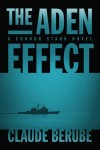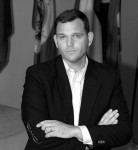The Aden Effect by Claude Berube
 By Jeff Ayers
By Jeff Ayers
 Claude Berube’s first novel is set against a background of modern piracy in the Gulf of Aden, the story begins as the new Ambassador to Yemen, C.J. Sumner, is assigned to negotiate access to the oil fields off the island of Socotra and enlist help countering pirates who are capturing ships at will off the Horn of Africa. Meeting with resistance to her diplomatic overtures, Sumner recruits Connor Stark, a former naval officer turned mercenary who knows the region, as her defense attache. When Stark sets up a meeting with the owner of a Yemeni shipping company and the ruling family, the challenges begin.
Claude Berube’s first novel is set against a background of modern piracy in the Gulf of Aden, the story begins as the new Ambassador to Yemen, C.J. Sumner, is assigned to negotiate access to the oil fields off the island of Socotra and enlist help countering pirates who are capturing ships at will off the Horn of Africa. Meeting with resistance to her diplomatic overtures, Sumner recruits Connor Stark, a former naval officer turned mercenary who knows the region, as her defense attache. When Stark sets up a meeting with the owner of a Yemeni shipping company and the ruling family, the challenges begin.
Against this backdrop, diplomatic security agent Damien Golzari is investigating the death of a State Department official’s son when he stumbles on an illicit khat trade involving Somali refugees in the United States. His probe leads him to Yemen and the shipping company owned by Stark’s contact. As a result of this chance discovery, the two men are forced to become unwitting allies when they discover that their mysterious roads lead to one source.
To earn the favor of the Yemeni government, Sumner sets up a humanitarian-assistance mission to Socotra. But the Navy warship assigned to assist her is attacked by pirates. Stark assumes command and mounts a daring counterattack. Sumner negotiates a treaty to develop the oil fields and provide mutual security from the pirates, who, unknown to her, are working with other powers. In a final confrontation, Stark and Golzari must decide whether to challenge a navy and the most powerful man in the world.
Claude chatted with ITW about THE ADEN EFFECT.
With your background in primarily non-fiction, what prompted you to try fiction?
Although I’m a historian by training, I always wanted to write both fiction and non-fiction but I spent most of my time with the latter. I wrote a couple of fiction manuscripts but they simply didn’t work for a variety of reasons. That’s part of the learning process and becoming a better writer. In the late 1980s, I was inspired by the works of Robert B. Parker (who wrote the Spenser series), Katherine Neville, Bill Granger (who wrote the November Man series) and certainly Tom Clancy. I believe my non-fiction books also provide me with some credibility with regard to the fiction. For example, my third book and several articles discussed the rise of private security companies at sea to counter piracy in the Gulf of Aden and elsewhere. The great part about fiction, however, is that I can turn every one of those ideas around and explain issues in an entertaining way. A novel still has an outline, a structure, but I can address the same issues in a very different way. Frankly, writing fiction is a lot more fun and challenging.
Naval Institute Press rarely publishes fiction. How did you end up there?
You’re right. It’s rare but they do it such as THE HUNT FOR RED OCTOBER, FLIGHT OF THE INTRUDER, PUNK’S WAR and some other works. This month, in addition to THE ADEN EFFECT, NIP will publish another novel, THE RECIPIENT’S SON. I’ve been a member of the U.S. Naval Institute for about 18 years primarily because of their monthly magazines – PROCEEDINGS and NAVAL HISTORY. People may not realize that USNI was founded in 1873 and had an incredible influence on the growing role of the Navy as it entered the 20th century and, arguably, as we have entered a new century. My former agent had pitched THE ADEN EFFECT to several publishers, all of whom passed on it. Because the novel dealt, in part, with naval operations, I then pitched it to Naval Institute Press. They were familiar with my work as I had written a number of articles for both PROCEEDINGS and NAVAL HISTORY going back a dozen years. After they accepted it, I had the opportunity to work closely with them on every facet of the book. I can’t say enough good things to say about their quality and commitment.
What inspired the story of ADEN EFFECT?
In short, a trip to Scotland. In 1989 when I originally wanted to write a novel, I intended a modern day Horatio Hornblower/Patrick O’Brian naval series beginning with a young officer on his first tour (yes, I’m a naval officer, but I wasn’t commissioned until many years later!) The various attempts at novel writing went by the wayside. In 2008 while touring Scotland again, I came across the small town of Ullapool. Something told me that this is the kind of place where the character Connor Stark would have settled. But how would a naval officer wind up there? That’s when the story fell into place for that character and story. I’ve also been to the region on a Navy ship which helped me think about the big picture as well some details. As we recently saw in Libya with the murder of our Ambassador and other Americans, the world is a dangerous place and we have both military personnel and diplomats on the front lines. International relations can be far more complex than we can get in a 140character Tweet or short op-ed.
Are the characters of CJ or Connor based on real people?
No, although one could see some similarities between CJ and a Condi Rice – both classical pianists, both measured and intelligent diplomats. Initially, I wanted the main characters to reflect the philosophies of John Locke, Thomas Hobbes, Jean-Jacques Rousseau, and Jeremy Bentham, but that didn’t work out. There is one character based on someone – sort of. In the movie AS GOOD AS IT GETS, Jack Nicholson’s character is asked: “How do you write women so well?” His answer: “I think of a man, and I take away reason and accountability.” That was the way I approached the character of the captain of the USS Bennington. I had the opportunity to serve twice overseas under an officer whom I hold in high regard. I listed out every one of his character traits and simply found the antonym in every case and came up with the CO of the Bennington. Also, the Navy has incredible officers in command of U.S. warships but in the past few years several have been relieved of command for various reasons. Some of those stories about their behavior became part of that character.
One thing I enjoyed about ADEN EFFECT was it was not too tech heavy. I will admit I don’t know much military jargon! Was this intentional on your part?
Yes it was for a couple of reasons. First, I only had 80,000 words to work with and if I got too much into the weeds of how things worked, then it meant I couldn’t address character development or other issues as much. Second, with regard to Navy technology, I wanted to be very careful about being too specific.
Any plans for more Connor Stark adventures?
Yes. I have a storyline that runs through four potential sequels, depending on how this first one does so I hope all the ITW members enjoy it and ask for more! I have the general stories for each one and a framework for the next book. Readers should expect to see some new characters in each as well as several characters introduced in THE ADEN EFFECT.
*****
 Claude Berube teaches at the U.S. Naval Academy. He has worked for the Office of Naval Intelligence and on Capitol Hill. In 2004, as a Navy Reserve officer, he deployed with Expeditionary Strike Group Five to the Persian Gulf. He is the coauthor of three works of non-fiction and over thirty articles.
Claude Berube teaches at the U.S. Naval Academy. He has worked for the Office of Naval Intelligence and on Capitol Hill. In 2004, as a Navy Reserve officer, he deployed with Expeditionary Strike Group Five to the Persian Gulf. He is the coauthor of three works of non-fiction and over thirty articles.
To learn more about Claude, please visit his website.
- Forsaken by Ken Newman - January 31, 2016
- Powerless by Tim Washburn - December 31, 2015
- Syren’s Song by Claude Berube - November 30, 2015
